- Home
- Ben Stevens
The Whistler: A Murderer's Tale Page 8
The Whistler: A Murderer's Tale Read online
Page 8
He seemed to invite her friendship but at the same time almost repel it, as though scared by what might develop. The attraction Marie had been certain he felt for her was now not so certain, and she was surprised to realise that this thought distressed her.
Like anyone else who’d heard Heinemann perform she recognised his awesome ability; he refused to play in any conventional manner and so drew attention to himself every time he picked up the violin.
This in itself caused her a certain amount of fear: the National Socialists opposed anything that went against the grain, anything that denoted individualism. And Heinemann denoted this and a great deal more every time he so much as bowed a note.
Heinemann had left the house as the afternoon darkened and Marie’s grandmother began weakly coughing, this along with the muted tones of the neighbour’s voice filtering through the floorboards into the living room below.
The guests began arriving, the men mostly middle-aged to elderly, their faces red with the sudden heat of the room. The women were mainly thin and tottered on heels that were too high. They looked eagerly for someone of greater importance than their husbands, so that they could truly feel part of the elite.
This, however, was no great occasion. The little cogs of the colossal machine were being greased with food and drink; but in the grand scheme of things they were nothing. Many owned businesses that gave dutifully to the Reich’s greedy coffers, and had not protested when it was requested that their Jewish employees be made redundant.
The hall soon filled with the vacuous hubbub of polite conversation, and the quartet began to play a gentle piece by Strauss. Heinemann felt Rath’s beady eye upon him, and understood that this was not the time to start drifting into a world of his own. He waded through the piece with displeasure, his attention captured rather by the ornately decorated ceiling than the music.
After nearly an hour the quartet stopped for a break. Rath left the stage to mingle with feigned politeness among the gathered guests. This was a torture for him; he despised the type of people gathered here tonight and to talk to them in such a stilted fashion destroyed him a little bit more.
He was known to some as being a ‘Jew-lover’; a man who’d nearly ruined his career through stupidly trying to defend his Yid associates. But he’d been shown! The Party was all powerful; it would not allow anyone to ignore its dictates.
Those others who’d worked and been friends with Jews consoled themselves with this – the Party was too powerful: it was not their fault.
Heinemann, Muehlebach and Marie had no choice but to remain seated and await the next performance, the pretentiousness of this occasion forbidding people of their youth to mingle with the guests.
Finally, Enrich Rath returned to the stage and the quartet began a piece by Vivaldi, playing with more feeling now that the atmosphere had lost some of its iciness.
Heinemann attempted to again fix his attention on the ornate ceiling, so as to continue playing without feeling or flair... But soon he pictured the composer writing this piece, felt his struggle to come up with something innovative – and the responsibility to develop this in the here-and-now irrevocably became the violinist’s own...
Rath looked uneasily at the guests as his young student’s playing became ever more noticeable, but there were no discernible signs of irritation among the crowd. Some of them didn’t even notice this increasingly enthusiastic playing, while others appreciated it as the evening became livelier.
Many now realised exactly whom this violinist was – Erich Heinemann, the young man who’d given performances in the Tiergarten during the summer, and the young man for whom it was rumoured Frau Sasse possessed such affection...
Heinemann’s enthusiasm reflected onto the others, Muehlebach failing to notice any irony in the fact that the Mischling was bringing out the very best in his playing. Both the red-haired student’s and Rath’s playing was technically perfect; it sought no status, no individuality. But even during the lighter pieces Marie’s cello sounded dark and ominous, a lurking menace behind the minnow-like darting of Heinemann’s playing.
When they finally finished it was this time to enthusiastic applause. The cloud that hung over Heinemann concerning his mixed-race was temporarily forgotten: the guests eagerly sought him out, keen to register their delight for his talent. The other two students received polite compliments, but only the half-Jewish teenager was given any real attention.
Fritz Muehlebach felt bitter that everyone in this hall appeared to have forgotten that a new era had dawned. That they should be fawning over a dirty Mischling! Surely, thought Muehlebach indignantly, there had to be another young violinist somewhere whose blood was purely German, who was Heinemann’s equal?
Marie merely longed to return home. Her grandmother’s condition was worsening and the faithful neighbour continued to look after her in between the doctor’s visits. But Marie’s position at Humboldt University was a little less certain than most, and so it had been a request not an invitation to play tonight.
As Rath talked to the others who’d let an evil grow in Germany with little or no protest from themselves, he felt nothing beyond a mind-numbing sense of despair. At times such as these he placed little value on his own life, and it was only the slight rays of light – Erich Heinemann now being one – that renewed any desire to continue living.
The teenage violinist was himself enduring a tedious conversation concerning Chopin with a half-drunk fat man. Heinemann’s interest in the lives of composers had never been great, despite the emphasis placed on the subject in Rath’s lessons. The lecturer often tonelessly described how those composer’s favoured by the Nazis had battled against odds invariably Jewish in nature before achieving success.
The majority of the class took notes neither believing nor disbelieving what they were being told: they knew individual thought to be a dangerous thing. Only Muehlebach appeared impassioned by what he heard, feverishly scribbling down every word while shooting Heinemann malevolent glances.
The conversation between Heinemann and the fat man was dragging when Heinemann saw Frau Stielke. Her moustache was hairier than ever and the excessive jewellery around her neck attempted to hide the fat that had correspondingly grown with her status.
She waddled over, a glass of wine clasped in her hand.
‘Erich!’ she slurred enthusiastically.
Heinemann curled his lips in a canine grimace intended to be a smile.
‘Frau Stielke – a pleasure to see you.’
‘Frau Stielke,’ greeted the man, Heinemann surprised that these two people evidently knew each other. The Academy head affectionately pawed Heinemann’s arm, sloshing a little of her wine onto the floor.
‘So you’ve met my former pupil, then?’ she asked the man, her pupils dilated and her cheeks flushed.
‘Yes, I have. Yet another fine example of your Academy, Frau Stielke,’ he replied politely, the woman’s obvious inebriation appearing to have somehow lessened his own state of intoxication.
‘So how are you, Erich? How is Humboldt?’
Heinemann flashed another uncertain smile.
‘I’m learning fast, as I’ve an excellent tutor –’
Stielke earnestly nodded.
‘The best,’ she said.
‘If anything I just find that money is a little tight,’ he finished.
Stielke now placed her free hand on the man’s arm.
‘Claus, dear, surely you must have something at the factory for Erich?’ she asked him.
Both Heinemann and ‘Claus’ looked at her with surprise, for she’d just broken two major rules of etiquette. Those aspiring to be part of the bourgeoisie addressed each other as Herr or Frau unless they were intimate friends, the only exception being for those with military or social titles. To do otherwise was to give the impression of being a member of the Halberstarken: a blue-collar worker.
And as Germany was governed by a party that had by now effectively made being Jewish a crime, asking an
employer to give even a partly-Jewish person a job was hardly fair.
The man who was in fact a factory manager called Claus Hartz looked at Heinemann, who did his best to make himself appear eager for such a chance – after all, he needed to get some extra money somehow.
Two immediate factors gave Heinemann’s employment prospects an advantage in Hartz’s alcohol-befuddled mind. Firstly, Heinemann was performing at a Christmas party arranged by the Party; so he was evidently not in disfavour with the Socialists. And secondly, in giving this Jewish-looking teenager a job Hartz would alleviate his troubled conscience at having replaced a Jew as manager a year earlier – and it still amazed him that Steinberg had held onto his position for as long as he had.
Claus Hartz consequently decided to give this young man a chance: he would have him put on one of the machines that required only an unskilled operator. The violinist looked too weak for any labouring duties outside in the yard, and perhaps that was just as well – Hartz could not guarantee how the rough, beer-drinking men who carried out such backbreaking work would have treated this thin teenager.
‘Why not?’ he said convivially, clasping Heinemann’s thin shoulder with one of his large hands. ‘Mette Construction is on the Stettin Plant, near –’
Stielke squealed with delight.
‘I know it – it’s only five minutes from the lodgings I found you. Oh, this is perfect!’
Heinemann smiled in a manner he hoped appeared grateful.
‘I know it too. I’m very grateful to you, Herr Hartz.’
Claus Hartz seemed almost to swell slightly with pride. He was an important man; he provided men with employment.
The fat beneath his chin wobbled pompously as he said, ‘No problem at all, young man. Come and see me after Christmas – we reopen on the twenty-seventh – and we’ll work out when you can work while allowing for your university studies. The last thing we want is for your music to suffer, eh?’
He looked at Stielke as he finished speaking, and she choked on a freshly-lit cigarette. All of a sudden she appeared rather ill, hurriedly putting down her glass on one of the long tables.
‘Excuse me,’ she requested, and she veered away through a room full of people who talked too loudly and with pseudo-importance.
Hartz took a glass of champagne from a passing waiter’s tray and excused himself from Heinemann’s company, already hoping that his offer of employment would not draw trouble from above. He was fundamentally a quiet man when sober, and so one who liked a quiet life.
Seconds later Marie drew-up beside Heinemann. The perfume she wore entranced him: the lipstick, the shoes. Every part of her was a sensual thrill.
‘Enjoying yourself, Erich?’ she asked, sipping from a glass of wine as she observed the people in the room.
Heinemann shrugged and did his best to appear entirely nonchalant.
‘I guess so. Anyway... how is your grandmother?’
‘She… does not have long.’
‘I’m sorry.’
For a second Marie looked at him, her eyes shining, her lips slightly apart: his stomach back-flipped. Then the look disappeared so suddenly that he was left wondering as to whether it had ever been there in the first place.
‘Thank you. I think I’d better wait outside – my neighbour is coming to collect me.’
With that she walked away from him; and taking more notice of his surroundings, Heinemann felt slightly shocked to observe the arm-banded men whom he presumed had only just entered the hall. The explanation of their presence was obvious: the party was over, the brief respite had ended and it was time to go back home to the truth.
Fritz Muehlebach slid over, trying to ingratiate himself with those members of the SA with whom he could claim an acquaintance. But his fawning was greeted with flint-like stares, and he soon received the message that they did not have any time for him.
One of the men met Heinemann’s eyes, the thin student preparing himself for the inevitable look of hatred. He was surprised when nothing of the kind was given: the man’s gaze merely moved on around the hall, checking to see the progress being made on its emptying.
Heinemann quickly looked outside for Marie but she was nowhere to be seen. She must have already been picked up. Heinemann returned inside. Most of the guests had left by now; an SA man nodded and laughed whenever necessary as he escorted a drunk and consequently talkative relic from a different era out of the hall.
The elderly man would feel awful tomorrow, with the fear regarding his alcoholic lapse of judgement coupled with the inevitable hangover. His ever-so-polite escort would certainly be noting everything that was being said, especially anything that could be considered disrespectful to the Fuhrer or the National Socialist Party.
Enrich Rath walked over to Heinemann, carrying their violins.
‘It appears as though the occasion has finished, so we may as well be on our way. It went well tonight, and I think you’ve made some new admirers, Herr Heinemann. By the way, don’t forget that we’re due to perform here again on New Year’s Eve.’
Heinemann nodded as he looked at the few guests still obstinately remaining: drunk, miserable specimens doing their best to hide from what was happening to their country...
Surely even Germany under the Weimar Republic – broken, economically ruined – was better than this…
Rath realised Heinemann’s thoughts and empathy again flared within him. He longed to confide in someone and so relieve his burden, not knowing how much longer he could continue his coldly polite charade. Inside of him burned the fires of humiliation and anger; a dangerous combination that continually threatened to rage out of control.
The teacher and his student left with the last of the guests, a few of the SA men stood outside the Aalto respectfully greeting Rath. These men were fully aware of just how close the senior lecturer had come to falling from grace; they’d not mocked his change of mind concerning his defence of his Jewish colleagues.
The thin, sallow youth who walked at his side merited hardly any attention at all. He’d been invited here to perform this evening and that was enough – on this occasion, at least, the SA members had no cause to trouble him.
8
On Christmas day Heinemann made himself sausage and sauerkraut, and was then obliged to listen as the old sailor who also lived on the first floor sang slurred snatches of verse that grew steadily louder and more lewd as the day progressed.
The sailor was the only other tenant of the large house of whom Heinemann was all too aware. He knew there were others; he could hear them at night as one might hear mice, scuttling past his door. Doubtless they had valid reasons for staying quiet and unnoticed – race, beliefs, political associations… God only knew what mismatch of people reviled by the Nazis lived under the same roof.
On the morning of 29 December Heinemann decided to visit Claus Hartz at Mette Construction, as money was becoming an increasingly major concern and any form of employment was better than just sitting around in his room.
So he left the house and walked along cobbled streets slippery with frost. Those few people who passed him refused any eye contact, clearly eager to return to the dubious sanctuary of their homes.
The Stettin Industrial Plant occupied a few acres of land, wire fencing marking its perimeters. The entrance was guarded by a battered Stop sign placed on a pole that had rusted in the raised position.
Occupying the site were squat buildings made from wood and brick, tin roofs overhanging the walls. From within came the noise of machinery, wooden pallets stacked outside.
At the entrance a faded map illustrated each company’s location within the plant, the industrial site being divided into sectors. Mette Construction was in sector ‘G’ and so Heinemann began walking towards the rear of the estate, in the process passing several grim-looking men whose unshaven faces were nothing so much as canvases depicting a lifetime of toil and precious little happiness.
A large sign on the building ahead informed him that he
’d reached his destination, and entering he was greeted by the roar of the machinery. He’d scarcely had time to observe the operators working in rhythm alongside their machines before a man was inquiring as to just what the bloody hell he wanted?
Shouting to be heard above the noise he stated his purpose: he was here to see Claus Hartz, who’d offered him employment just a few days ago. The man scrutinised this sallow-faced youth who’d entered his world, as Heinemann in turn realised that this blond-haired specimen dressed in blue overalls was not like the others he’d seen so far within the Stettin Industrial Plant. For his face was clean-shaven and showed not a trace of drudgery or despair. Smelling strongly of soap, his appearance was that of a man perfectly content to dwell within the confines of factory life.
Pointing to an iron staircase that led to a door above the factory-floor, he put his mouth an inch from Heinemann’s ear and said, ‘Hartz’s office is up there.’
Heinemann perfunctorily thanked the man, who shrugged and walked away. Heinemann then made his way past fast-moving machinery, the operators sparing him a cursory glance before returning their attention to their work. Orders were coming in thick and fast, and Mette Construction was running at its maximum output.
The men were at least guaranteed their jobs, but there was little extra pay for their increased efforts and overtime. Posters in support of the National Socialist Party had been stuck up on the wall, as was expected, but they still managed to reflect the worker’s cynicism. They were not clean and crease-less as they were at Humboldt University; they were peeled at the edges, with one stained as though tea or coffee had been thrown at it.
Depicted on another was the staple illustration of workers toiling in a field, beneath this the slogan: The Common Interest before One’s Self! And below this some comedian had written – in large letters which conveyed perfectly the intended sarcasm – the word Comrade.

 Hostile Genus: An Epic Military Sci-Fi Series (Invasive Species Book 2)
Hostile Genus: An Epic Military Sci-Fi Series (Invasive Species Book 2)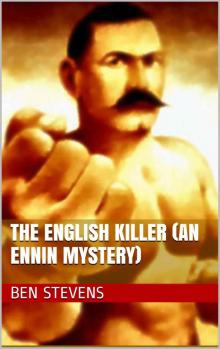 The English Killer (An Ennin Mystery) (The Ennin Mysteries Book 31)
The English Killer (An Ennin Mystery) (The Ennin Mysteries Book 31) The Ennin Mysteries: Collected Series 1 – 5 (25 Stories) MEGAPACK
The Ennin Mysteries: Collected Series 1 – 5 (25 Stories) MEGAPACK Tokyo Zombie Apocalypse
Tokyo Zombie Apocalypse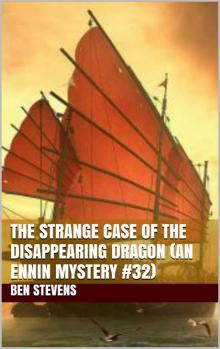 The Strange Case of the Disappearing Dragon (An Ennin Mystery #32)
The Strange Case of the Disappearing Dragon (An Ennin Mystery #32) I, Hell
I, Hell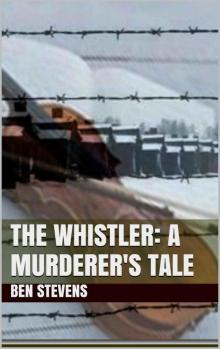 The Whistler: A Murderer's Tale
The Whistler: A Murderer's Tale Parker: The Story of an Apocalypse Survivor: COMPLETE SERIES
Parker: The Story of an Apocalypse Survivor: COMPLETE SERIES Confessions of a Japanese Temple Gardener: (P.S – Who's from London, England)
Confessions of a Japanese Temple Gardener: (P.S – Who's from London, England)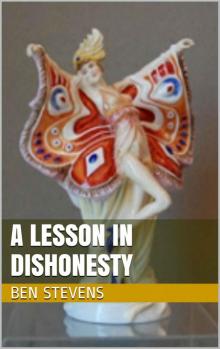 A Lesson in Dishonesty
A Lesson in Dishonesty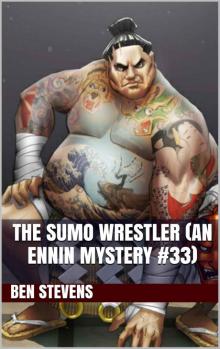 The Sumo Wrestler (An Ennin Mystery #33)
The Sumo Wrestler (An Ennin Mystery #33)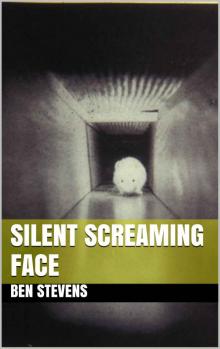 Silent Screaming Face
Silent Screaming Face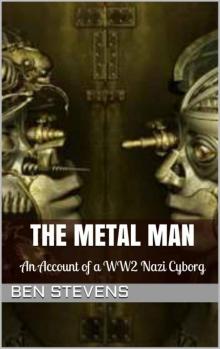 The Metal Man: An Account of a WW2 Nazi Cyborg
The Metal Man: An Account of a WW2 Nazi Cyborg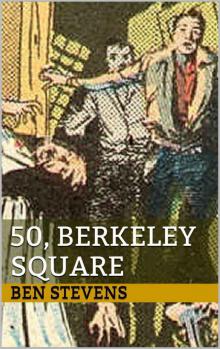 50, Berkeley Square
50, Berkeley Square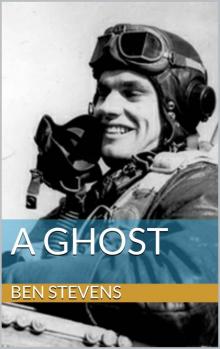 A Ghost
A Ghost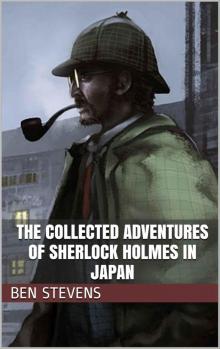 The Collected Adventures of Sherlock Holmes in Japan
The Collected Adventures of Sherlock Holmes in Japan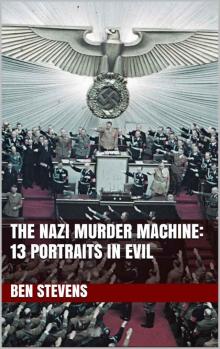 The Nazi Murder Machine: 13 Portraits in Evil
The Nazi Murder Machine: 13 Portraits in Evil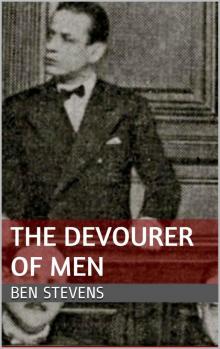 The Devourer of Men
The Devourer of Men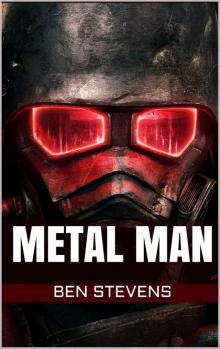 Metal Man
Metal Man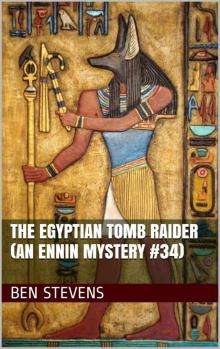 The Egyptian Tomb Raider (An Ennin Mystery #34)
The Egyptian Tomb Raider (An Ennin Mystery #34)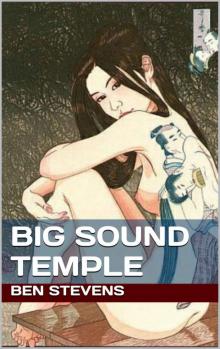 Big Sound Temple
Big Sound Temple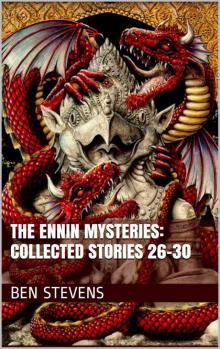 The Ennin Mysteries: Collected Stories 26-30
The Ennin Mysteries: Collected Stories 26-30